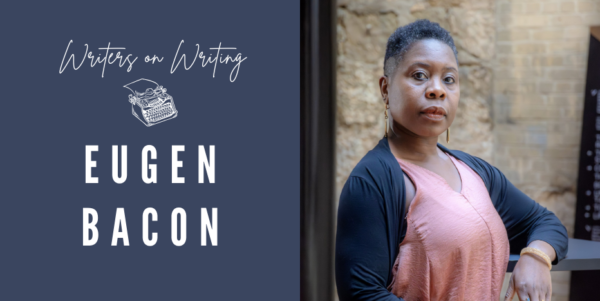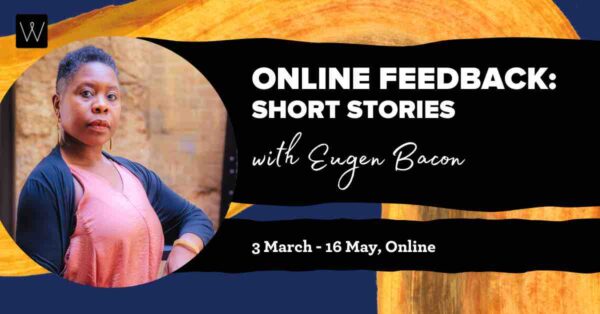
Writers on Writing is our regular conversation with a writer or industry professional about the writing craft, industry insights, and their own practice. This week, we spoke to Eugen Bacon about crucial elements of short stories including characters, setting and dialogue.
In short fiction, how crucial is it to limit the number of story elements such as characters and setting?
The short story is a literary fragment that insists on immediacy, brevity, intensity. My stories—irrespective of setting—are character-based: a character’s relationship with themselves, with others, and with the world around them.
Character and setting are important, but in a less-is-always-more way. A good short story has a hook beginning that plunges you right in, an engaging middle that carries the story forward, and an ending that ends before it ends.
How important is dialogue to the short story form?
Dialogue is extremely crucial in a short story. It builds character—through quirks, mannerisms and ways of saying. It unveils history, as in backstory—how our character got here, and cleverly moves the story forward.
Good dialogue is unexpected. It startles in a fetching way. The secret to writing good dialogue is listening to how people speak—we never speak in perfectly grammatical sentences. And we speak to advance an agenda.
In a first-person story, a well-crafted narrative voice can replace dialogue. Susan Midalia does this really well in her short story collections, for example in her story ‘Dear Prime Minister’ in Miniatures.
Your work has appeared in many publications worldwide, including in Apex Magazine, Award Winning Australian Writing, and Year’s Best African Speculative Fiction. What are publications looking for when publishing short fiction?
What a publisher or editor looks for varies—anthologies can be trickier because you’re writing to someone else’s muse and must meet a specified theme and word range. Publications will, sometimes excruciatingly, be upfront about specifications. Always read the guidelines—editors can be pedantic about what they’re asking for. If a publication is too stipulative on do’s and don’ts, it says something about them, and sometimes you’re better off without them.
My stories are generally 3,000 to 6,000 words, but I’ve also written flash fiction—one, ‘A Strange Communion’ that appears in Danged Black Thing is only 250 words.
When giving and receiving feedback on short fiction, is it more important to focus on the ‘big picture’ (overall story) or ‘little picture’ (story elements)?
One writer, Paul Ariss says short stories “come to visit for a while, take you somewhere you didn’t expect and then put you back where you started before you’d even realised you were gone”.
Another writer, Alistair Canlin, says: ‘you can throw the reader straight into a world, and pull them out again just as quickly, leaving them asking questions, and constantly thinking.’
There’s power in specificity in a short story, being vivid yet sparsity.
My writerly feedback, again and again, is to work on the beginning, the ending, and the middle:
- Say it in fewer words…(less is always more)
- Say it powerfully… (use words that matter)
- Say it beautifully… (use poignant words that move the reader).
Eugen Bacon is an African Australian author. She’s a British Fantasy and Foreword Indies Award winner, a twice World Fantasy Award finalist, and a finalist in the Shirley Jackson, Philip K. Dick, Victorian Premier’s Literary Award (for her novel Serengotti), and the Nommo Awards for speculative fiction by Africans. Eugen was announced in the honor list of the Otherwise Fellowships for ‘doing exciting work in gender and speculative fiction’. Danged Black Thing made the Otherwise Award Honor List as a ‘sharp collection of Afro-Surrealist work’. She’s an Adjunct Fellow at the University of Tasmania, and a 2024 Hedberg Writer-in-Residence. Visit her at eugenbacon.com.
Join Eugen’s course, Online Feedback: Short Stories, starting on Monday 3 March. Enrol here >>
If you want to be the first to read great advice, prompts and inspiration from our incredible tutors, subscribe to our weekly e-newsletter Newsbite.
More from Writing NSW
Check out our full range of writing courses in Sydney, our online writing courses and our feedback programs to see how we can help you on your creative writing journey. Find out about our competitions and opportunities, as well as writing groups across NSW, and sign up to our weekly newsletter for writing events, opportunities and giveaways.

